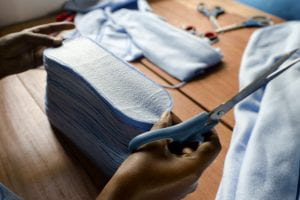
Period poverty is the lack of access to sanitary products, menstrual hygiene education, toilets, handwashing facilities, and or waste management. The term also refers to the increased economic vulnerability that women and girls face due to the financial burden posed by menstrual supplies. In least-developed and low-income countries, access to hygienic products such as pads, tampons, or cups is limited. This means that girls will often resort to using proxy materials such as mud, leaves, or animal skins to try to absorb the menstrual flow. As a result, such women are at a higher risk of developing certain urogenital infections, like yeast infections, vaginosis, or urinary tract infections. This becomes an issue because while the majority of women are of reproductive age, the majority of these women and girls are unable to practice proper hygiene practices. Consequently, women and girls around the world, especially in developing countries, face numerous challenges in managing their menstruation. Furthermore, some/many women are forced to approach this normal bodily function with silence due to stigma, as some communities consider menstruation to be taboo.
What causes period poverty?
One cause is that pads and other supplies may be unavailable or unaffordable. This means that women are often forced to choose between purchasing sanitary pads and different basic needs, or they may live in areas where there is no access to hygiene products at all. More importantly, young girls may lack access to toilet facilities with clean water to clean themselves while on their periods. In addition, discriminatory cultural norms make it challenging to maintain good menstrual hygiene as women often have to hide, or the community may not put enough effort into establishing hygiene facilities or practices around them. Also, some women and girls lack the necessary education and information about menstruation and good hygiene practices because topics around menstruation and proper hygiene practices are rarely discussed in families or schools.
What is more, other girls may experience menstruation with little or no knowledge of what is happening. This makes it harder for women to adopt sanitary practices because most remain unaware of recommended hygiene practices. In many communities, menstruating girls and women are still banned from kitchens, crop fields, or places of worship. There is also the issue of forced secrecy in communities where girls are exposed to ‘menstrual etiquette.’ This etiquette encourages the careful management of blood flow and discomfort and the importance of keeping menstruation hidden from boys and men.
A Human Rights Issue.
It is important to consider gender inequality, extreme poverty, and harmful traditions as the source of menstrual hygiene deprivation and stigma. This often leads to exclusion from public life, heightened vulnerability, and creates barriers to opportunities such as employment, sanitation, and health.
Some of the human rights that are undermined by period poverty include,
- The right to human dignity– When women and girls cannot access safe bathing facilities and safe and effective means of managing their menstrual hygiene, they are not able to manage their menstruation with dignity. Menstruation-related teasing, exclusion, and shame also undermine the right to human dignity.
- The right to an adequate standard of health and well-being– Women and girls may experience negative health consequences when they lack the supplies and facilities to manage their menstrual health. Menstruation stigma can also prevent women and girls from seeking treatment for menstruation-related disorders or pain, adversely affecting their health and well-being.
- The right to education – Lack of a safe place or ability to manage menstrual hygiene as well as lack of medication to treat menstruation-related pain can all contribute to higher rates of school absenteeism and poor educational outcomes. Some studies have confirmed that when girls are unable to manage menstruation in school properly, their academics and performance suffer.
- The right to work – Poor access to safe means of managing menstrual hygiene and lack of medication to treat menstruation-related disorders or pain also limit job opportunities for women and girls. They may refrain from taking specific jobs, or they may be forced to forgo working hours and wages. Menstruation-related needs, such as bathroom breaks, may be penalized, leading to unequal working conditions. And women and girls may face workplace discrimination related to menstruation taboos.
- The right to non-discrimination and gender equality – Stigmas and norms related to menstruation can reinforce discriminatory practices. Menstruation-related barriers to school, work, health services, and public activities also perpetuate gender inequalities.
What is being done?
In spite of the issues presented, it is essential to acknowledge that a lot is being done around the world to help eradicate period poverty.
For example, UNFPA (United Nations Population Fund), has various approaches to promoting and improving menstrual health around the world. Some of them include,
- UNFPA reaches women and girls directly with menstrual supplies and safe sanitation facilities. In humanitarian emergencies, UNFPA distributes dignity kits, which contain disposable and reusable menstrual pads, underwear, soap, and related items. (In 2017, 484,000 dignity kits were distributed in 18 countries.)
- The UN organization also promotes menstrual health information and skills building. For example, some UNFPA programs teach girls to make reusable sanitary napkins. Others raise awareness about menstrual cups.
- Furthermore, the organization aims to improve education and information about menstruation as human rights concerns. This is done through its youth programs and comprehensive sexuality education efforts, such as the Y-Peer program.
- UNFPA also procures reproductive health commodities that can be useful for treating menstruation-related disorders. For instance, hormonal contraceptive methods can be used to treat symptoms of endometriosis and reduce excessive menstrual bleeding.
- Similarly, UNFPA is helping to gather data and evidence about menstrual health and its connection to global development. For instance, UNFPA supported surveys provide critical insight into girls’ and women’s knowledge about their menstrual cycles, health, and access to sanitation facilities. A recent UNFPA publication offers a critical overview of the menstrual health needs of women and girls in the Eastern and Southern Africa region.
Further Recommendations
While there exists a lot of support to help end period poverty, there is still a lot that can be done to improve access to sanitary products, menstrual hygiene education, toilets, handwashing facilities, and, or waste management. Human Rights Watch and WASH United recommend that groups which provide services to women, evaluate their programs to determine whether a woman or girl has,
- Adequate, acceptable, and affordable menstrual management materials;
- Access to appropriate facilities, sanitation, infrastructure, and supplies to enable women and girls to change and dispose of menstrual materials; and
- Knowledge of the process of menstruation and options available for menstrual hygiene management.
Practitioners engaged in programming or advocacy related to menstrual management should also,
- Have an awareness of stigma and harmful practices related to menstruation in the specific cultural context where they are working.
- Support efforts to change harmful cultural norms and practices that stigmatize menstruation and menstruating women and girls;
- Address discrimination that affects the ability to deal with menstruation, including for women and girls with disabilities
- Be aware of and incorporate human rights principles in their programming and advocacy, including the right to participate in decision-making and to get information.
Moreover, women and girls must have access to water and sanitation. This will allow the establishment of private areas to change sanitary cloths or pads, clean water for washing their hands and used fabrics, and facilities for safely disposing of used materials or drying them if reusable. It is also imperative that both men and women have a greater awareness of menstrual hygiene. This means that training and learning courses should be made available for women and young to teach them the importance of menstrual hygiene and the proper practices. Likewise, educating boys on the challenges and struggles girls face could help reduce stigma and help them become more understanding and supportive husbands and fathers. Less work has been done in this area, but the benefits of educating boys about adolescence for both themselves and female students are increasingly being recognized.
It is essential to acknowledge that there is still limited evidence to understand women’s use of sanitation and menstrual management facilities. Therefore, there is a need for individuals to pay special attention to the needs of women and girls all over the world.


